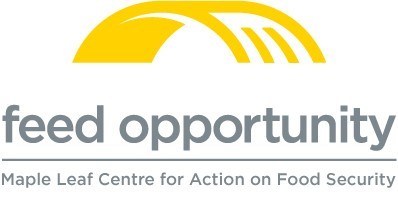LifeCycles, The SEED, FortWhyte Farms and Eat West Coast advance food security in their communities
MISSISSAUGA, ON, Dec. 4, 2018 /CNW/ – The Maple Leaf Centre for Action on Food Security (“the Centre”) today announced investments in four innovative new projects that advance food security in their communities. These include LifeCycles in Victoria, British Columbia; The SEED in Guelph, Ontario; FortWhyte Farms in Winnipeg, Manitoba; and Eat West Coast in Tofino, British Columbia. The Centre has committed approximately $4.5 million in funding to support 15 projects since it was established in late 2016.


Although Canada is one of the wealthiest nations in the world, over four million Canadians face hunger, largely as a result of poverty, along with geographic, health and social barriers. This is a systemic and worsening social issue that requires urgent public policy reform and community-based interventions.
“The pervasive issue of hunger in Canada, which is deeply rooted in poverty, defies our national values and wealth as a nation,” said Sarah Stern, director of the Centre. “Public policy has a critical role to resolve this social injustice, supported by innovative community-led approaches that advance food security and human dignity. From remote First Nations communities to building social enterprise models, these four new partnerships bring these principles and objectives to life.”
The Centre partners with organizations across Canada to identify interventions that can be scaled up or out and share learnings to increase collective impact. In addition, the Centre works to raise awareness and engagement of Canadians on this critical social issue and to advocate for public policies that will advance access to good food for all Canadians.
This fall, the Centre launched a nation-wide digital campaign, featuring video vignettes of two of its partners, Food First NL (Newfoundland and Labrador) and FoodShare (Toronto), to raise awareness of food insecurity and innovative approaches to create sustainable change. The video vignettes feature Kristie Jameson, Executive Director of Food First NL and Paul Taylor, Executive Director of FoodShare and are being shared on multiple digital platforms. To view the videos, click here.
About the Centre’s newest partners and projects:
LifeCycles supports community food programming in the southern region of Vancouver Island. Their programs connect people to growing, accessing and eating food by scaling the harvesting and distribution of healthy fruits in urban environments. LifeCycles is partnering with the Centre to develop an online “Gleaning Hub”; a web-based system designed to support gleaning projects across Canada. The Gleaning Hub will enable a digital platform for tree owners and farms to register details about their fruit and produce, and for volunteers and staff to schedule and organize harvesting activities and distribution to local food security agencies. The goal is to develop and pilot the system so that it may provide a national platform.
The SEED is a community food project of the Guelph Community Health Centre that delivers community programs, operates social enterprises, and advocates to address the causes and effects of food insecurity. With support from the Centre, The SEED is modelling a social-enterprise-based approach to reducing food insecurity and creating a sustainable funding model. As the SEED expands its initiatives, it will create employment and training opportunities to support, train, and employ NEET (“Not In Employment, Education, or Training”) youth.
FortWhyte Farms enhances the economic status and food security of vulnerable youth through the development of employment skills and financial literacy. FortWhyte Farms is a working farm that is situated on an urban greenspace in Winnipeg, Manitoba on Treaty 1 Territory and is the home of the Metis Nation. Through education programs on food and employment, FortWhyte Farms provides young people with the tools necessary to move into meaningful employment and work towards independent food security. With funding from the Centre, FortWhyte Farms will expand the reach of their youth programs.
Eat West Coast is a hub for food security action in the Clayoquot Sound Biosphere Reserve region, on the west coast of Vancouver Island, that brings together community partners to build a healthy food system. Based out of Tofino, Eat West Coast supports eight remote settlements with a largely young population, more than a third of whom reside in First Nations communities. While there is an abundance of land and ocean-based foods, these communities lack the ability to preserve foods to support year-round food security. With support from the Centre, Eat West Coast will develop a region-wide program to revive local land-based food knowledge, and train community leaders in food preservation techniques (storing, canning, smoking, pickling, drying, etc.).
The Maple Leaf Centre for Action on Food Security, which was launched in December 2016, supports 11 other innovative projects across Canada:
- Food Secure Canada (FSC)
- Meal Exchange
- Ottawa Food Bank
- Kamloops Food Policy Council (KFPC)
- Community Food Centres Canada
- Food First NL
- FoodShare Toronto
- Greater Vancouver Food Bank
- McQuesten Urban Farm
- NDG Food Depot
- Northern Manitoba Food, Culture and Community Collaborative
Please visit www.feedopportunity.com for more information about the Centre, its programs, resource materials and how to apply to be a partner.
To engage with the Centre, follow us on Twitter @feedopportunity and like us on Facebook Facebook.com/FeedOpportunity.
About the Maple Leaf Centre for Action on Food Security
The Maple Leaf Centre for Action Food Security (“the Centre”) is a registered charity that seeks to advance sustainable food security and work collaboratively to reduce food insecurity in Canada by 50% by 2030. The Centre’s areas of focus include advocacy, innovation and learning. Launched in December 2016, the Centre partners with organizations that are testing and expanding innovative approaches to advance sustainable food security. The Centre shares learning from its work and supports networks, collaboration and research that builds further understanding of the issues and approaches that advance healthy, sustainable food for all Canadians
SOURCE The Maple Leaf Centre For Action On Food Security
Media Contact: Monique Marozzo, 905-285-5827, Monique.Marozzo@mapleleaf.com; Maple Leaf Centre for Action on Food Security Contact: Sarah Stern, Maple Leaf Centre for Action on Food Security, Sarah.Stern@mapleleaf.com